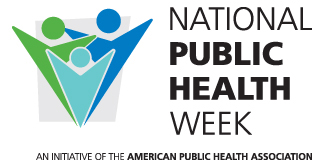
NYMC Celebrates National Public Health Week Virtually
National Public Health Week Was Observed With A Series of Seminars by Public Health Experts

New York Medical College (NYMC) celebrated National Public Health Week (NPHW) with a wide-ranging virtual seminar series, April 5 – 8, to fit this year’s theme of the American Public Health Association, “Building Bridges to Better Health.” The seminars, organized by the Student Healthcare Executives Club (StuHE) and the Department of Public Health in the School of Health Sciences and Practice (SHSP), covered a range of topics including air pollution, the role of health departments during health crises, biostatistics and the role of education in population health.
Robert W. Amler, M.D., M.B.A., dean of the SHSP and vice president for government affairs, helped kick off the week. “Happy National Public Health Week,” he said. “Let’s celebrate another year where public health, for better or for worse, has really been at the forefront of everybody’s minds, every newscast and the protection of everyone’s family.”
The first seminar, “Outside in: What Do Human Experiments Tell Us About How Air Pollution Hurts Us,” was presented by Howard Kipen, M.D., M.P.H. professor of environmental and occupational health at Rutgers School of Public Health and director of clinical research and occupational medicine at the Rutgers Environmental and Occupational Health Sciences Institute. Dr. Kipen spoke about the effect of air pollution on cardiovascular health, using examples from air pollution levels at the 2008 Beijing Olympics and its effect on athletes and test subjects exposed to extended periods on New Jersey highways.
NYMC alumnus Oscar Alleyne, Dr.P.H. ’12, chief program officer, National Association of County and City Health Officials led a presentation, “Our Path Forward: Building Resiliency with Innovation and Optimism,” which spoke to the roles of local and county health departments during health crises, such as virus outbreaks. Dr. Alleyne said that he would like to see funding to local health departments be more direct in order to be more effective. “The way we conduct governmental public health has to change,” Dr. Alleyne said.
Alumna, Nancy Stambler, Dr.P.H. ’11, who is an adjunct assistant professor of Public Health for the SHSP and biostatistician at Progenics Pharmaceuticals, presented “The Roles of Biostatisticians in Drug and Device Development from Study Design to Regulatory Submission.” Dr. Stambler broke down the process of how prospective drugs must go through tests and regulations before being considered for federal approval.
The week of seminars concluded with “Improving Population Health: What Role Does Education Have to Play?” by John Allegrante, Ph.D., professor of health education and public health at Columbia University. Dr. Allegrante took a deeper look at the correlation between physical health and other external factors and the education levels in young students. He showed that if factors such as physical well-being are negatively affected, it could hurt a student in the classroom.
To mark this year’s NPHW observance, StuHe partnered with Feeding Westchester, to provide food items for their Meals-4-Kids Project. Feeding Westchester is Westchester County’s largest hunger-relief organization and is a member of Feeding America, the national network of more than 200 food banks serving every state in the United States.

